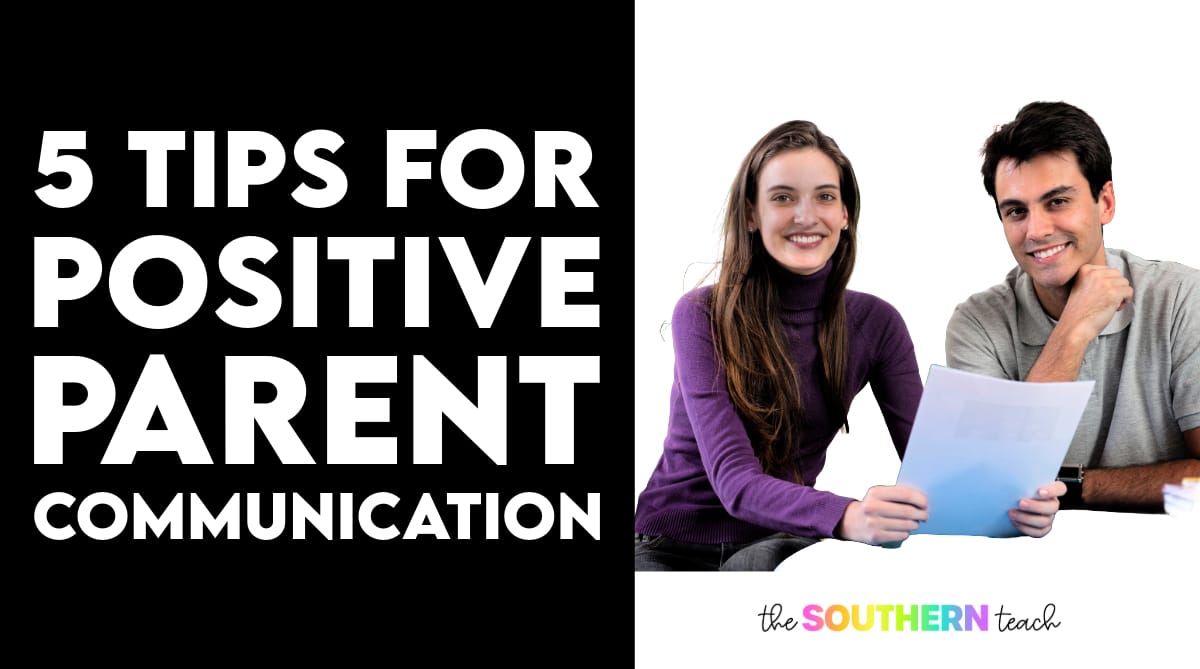
Share This Post:
From the super sweet parent to the worried parent to (our favorite) the helicopter parent, teaching has become more than just teaching phonics and arithmetic. Maintaining positive parent communication can be really tough, ON TOP OF everything else that we’re already responsible for.
But the work of creating genuine connection with the parents of our students is absolutely worth it. The parents of our students are sending us their best. So, caring for our students often also means caring for their parents as well!
There are some families who, no matter what you do or who you are, will always believe you are at fault. But with a few solid strategies in place, you can build trust with enough parents to make your year run more smoothly.
Here are 5 parent communication tips that have worked for me!

Tip #1: Practice Reassurance and Patience
Practicing reassurance and patience will help you avoid MANY problems in the long run. This is easiest to do early in the year when you are still feeling fresh and energetic. You can bring confidence to worried parents right at the beginning so that they are not so nervous later on.
For example, when parents email or call you right at the beginning of the year to talk about their children’s needs, think about their concerns with collaboration in mind.
How can you incorporate strategies from home that work for them? How can you make this a team approach so that parents have buy-in to support your teaching style?
If you dismiss their worries right from the get-go, it will only make them feel like you don’t care. This doesn’t set you up for positive parent communication at all! So take a few minutes and gently help them understand that everything will be okay.
Remember, parents are sending us their best; they just need to know that we care about their children and that we will have their best interest at heart.
Tip #2: Be Firm but Kind
The second tip for positive parent communication is to be firm, but kind. Ask yourself: who is the expert in the classroom? In the parent-teacher relationship, who is the one leading the classroom? Who is the one doing the work?
You. The answer is YOU!
With students who are struggling, or with parents who are being rude, it is important to hold firm to your values so that everyone can be on the same page.
Of course, this also needs to be done with kindness. Being firm but kind means also being reasonable in your expectations. People can sniff out unreasonable expectations 10 miles away. T
here will always be the parents who will never be reasonable in response, but in order to get the reasonable parents on your side, you need to be reasonable too.
(Yes, we used the word “reasonable” a lot here. There’s no other way to put it – IT’S IMPORTANT!)
And that leads us to the next tip, which is…

Tip #3: Set Clear Boundaries
In other industries, having office hours is completely normal. Somehow though, teachers are expected to be available to parents and students and their administration 24 hours a day, 7 days a week, 365 days a year.
We’re even expected to share sensitive information about other kids to other parents! It’s weird!
In order to protect your time like a Momma Bear, you can set boundaries for when you respond to questions or requests. You can provide a schedule that matches with your prep times, or your office hours can be an hour before or after school.
For sensitive information, you will need to be clear on what we are allowed to share. Classified information, for example, is a big NO.
Establishing these boundaries EARLY will make the rest of your year run much more smoothly. Parents will be less likely to push your buttons because they will know what to expect, which then allows for more positive parent communication.
Tip #4: Create an FAQ
Another way to protect your time is to create an FAQ section on your teacher webpage. Several parents may email you with similar questions about how your classroom operates, so having this handy with commonly asked questions will give you a place to refer them to.
No need to re-explain yourself 15 times for the 3rd time to the same parents: just send them the link to your FAQ, and voila – time saver!
And finally, the last tip…

Tip #5: Pick Up That Phone!
As a parent, the worst thing to get is a 2 page essay explaining a conflict that happened in class. The same can be said the other way around: we hate receiving long messages with no sense of tone. It’s the quickest way to miscommunicate each other’s intentions.
This is why, for important matters, pick up the phone and CALL THE PARENT.
Direct phone calls are the best way to communicate matters that are urgent or important, rather than sending a long email. This is true for several reasons:
- No need to think and rethink how to write something down that will not offend
- No need to worry about the email getting forwarded to the wrong person
- Both sides will hear tone and intent in each other’s voices, which leads to more openness
- Added bonus: it’s MUCH faster
Then, once that phone call is done, send a quick email to follow up with a summary of what you talked about so that at least you have a record of what you both agreed to.
Doing this gives parents a sense of security, which then of course leads to positive parent communication in the future!
Parent Communication CAN be a Positive Thing!
I hope that gave you several ideas on what can be done within our control to build positive parent communication. If you’d like to hear more, such as how to respond and prepare for different kinds of parents who come through your classroom, check out my FREE podcast series here!

kirsten hammond
Kirsten is a former 3rd and 5th grade teacher who loves helping upper elementary teachers by creating resources and sharing ideas that are engaging, research-based, and TEKS-aligned. She is a work-from-home mama of 3 rambunctious little ones and loves running, true crime, and lots of coffee.











